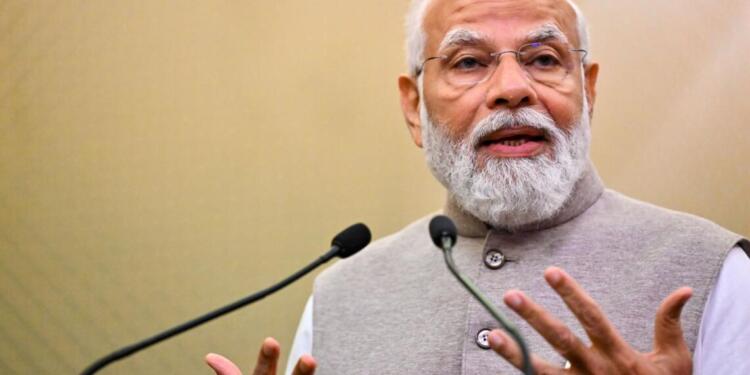As the country marked 50 years of Emergency, Prime Minister Narendra Modi today announced a book that chronicles his experience during those years and how they shaped his journey as a leader. ‘The Emergency Diaries’, book relies on first-person accounts of associates who worked with him back then, and other archival material.
Book on Emergency Years
The book offers a rare glimpse into the Prime Minister’s early political journey during the Emergency period (1975-77), detailing his experiences as a young RSS Pracharak and his participation in the resistance movement. In a tweet on X (formerly Twitter), PM Modi said, ‘The Emergency Diaries’ chronicles my journey during the Emergency years. It brought back many memories from that time. I call upon all those who remember those dark days of the Emergency or those whose families suffered during that time to share their experiences on social media. It will create awareness among the youth of the shameful time from 1975 to 1977.”
Union Home Minister Amit Shah will launch the book later this evening, while former Prime Minister and anti-Emergency stalwart H.D. Deve Gowda has penned the foreword. The publisher BlueKraft Digital Foundation called the book the first of its kind, painting a vivid picture of Modi’s unwavering commitment to the ideals of democracy.
“Emergency Diaries paints a vivid picture of Narendra Modi fighting for the ideals of democracy and how he has worked all his life to preserve and promote it. This book is a tribute to the grit and resolve of those who refused to be silenced,” the Foundation said.
Samvidhan Hatya Divas: Remembering the Assault on Democracy
Every year on June 25, the nation now observes Samvidhan Hatya Divas (Constitution Killing Day), a solemn reminder of how the Congress-led government suspended the very soul of Indian democracy. In a separate tweet, PM Modi wrote: “On this day, the values enshrined in the Indian Constitution were set aside, fundamental rights were suspended, press freedom was extinguished and several political leaders, social workers, students and ordinary citizens were jailed. It was as if the Congress Government in power at that time placed democracy under arrest.”
He further added, “No Indian will ever forget the manner in which the spirit of our Constitution was violated, the voice of Parliament muzzled and attempts were made to control the courts. The 42nd Amendment is a prime example of their shenanigans. The poor, marginalised and downtrodden were particularly targeted, including their dignity insulted.”
Modi’s Resistance: A Leader is Forged in Adversity
As a young RSS Pracharak during the Emergency, Narendra Modi played a key role in the underground movement that sought to resist Indira Gandhi’s authoritarian regime. Modi described the experience as deeply transformative. “The anti-Emergency movement was a learning experience for me. It reaffirmed the vitality of preserving our democratic framework. At the same time, I got to learn so much from people across the political spectrum,” he wrote on X.
The book is based on first-person anecdotes from his close associates during those years and archival documents. It highlights how the Emergency years shaped his lifelong resolve to protect democratic values and individual freedoms. Modi’s rise from an underground activist to India’s most transformative leader is chronicled through untold stories of courage and resilience.
The Emergency: A Nation Silenced
On June 25, 1975, then Prime Minister Indira Gandhi imposed a nationwide Emergency, citing internal disturbances and national security threats. In reality, it was a move to crush growing dissent against her government. The Emergency lasted 21 months and is often described as the darkest chapter in Indian democracy.
During this period, civil liberties were curtailed, the press was muzzled, opposition leaders were jailed without trial, and the Constitution itself was subverted through the controversial 42nd Amendment. Fundamental rights were suspended, and even the right to approach courts for justice was denied. From students to social workers, journalists to judges, no one was spared.
Millions of Indians bore the brunt of this authoritarian clampdown. Mass forced sterilisation drives, slum demolitions, and arbitrary arrests became commonplace. It was a time when democracy was literally placed under arrest, and fear loomed large over the country.
A Call to Safeguard Democracy
The launch of ‘The Emergency Diaries’ is not just a look back at a dark past but a timely reminder of what is at stake if democratic institutions are not guarded. As India continues its journey towards becoming a Viksit Bharat, the book serves as a tribute to those who stood firm against tyranny and as a warning against complacency.
“We salute every person who stood firm in the fight against the Emergency. These were people from all over India, from all walks of life, from diverse ideologies who worked closely with each other with one aim: to protect India’s democratic fabric and preserve the ideals for which our freedom fighters devoted their lives,” PM Modi stated.
He concluded with a message of optimism and resolve: “We also reiterate our commitment to strengthening the principles in our Constitution and working together to realise our vision of a Viksit Bharat. May we scale new heights of progress and fulfil the dreams of the poor and downtrodden.”
‘The Emergency Diaries’ is more than a book it is a historical document, a personal memoir, and a political statement all rolled into one, offering both reflection and inspiration for generations to come.

























